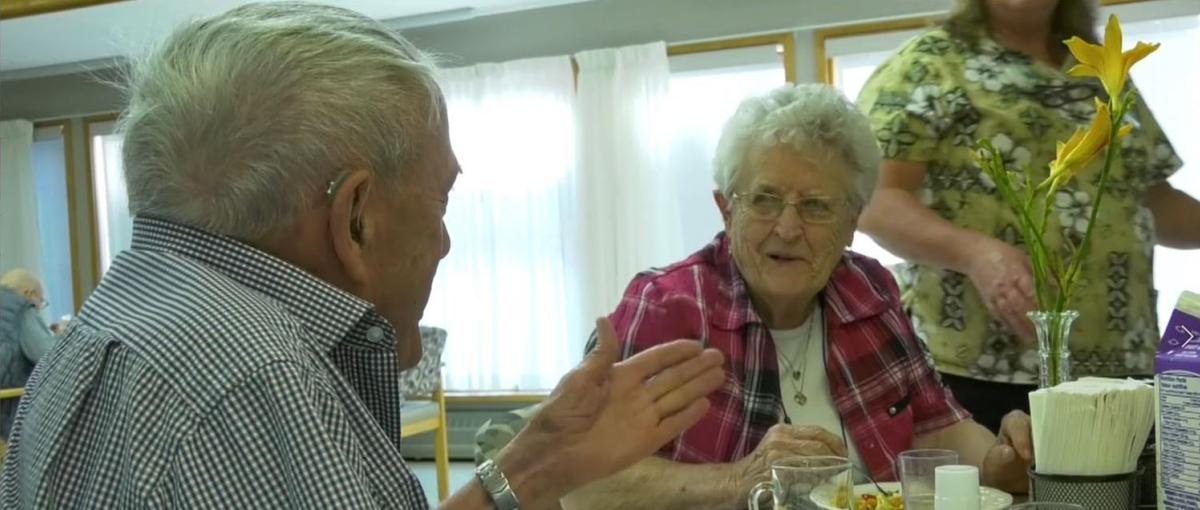Embracing change in rural care
Covenant teams help communities access health services closer to home

November 8, 2021
By Brenton Driedger, Social Media and Storytelling Advisor, Covenant Health
When Geri Clark thinks about the healthcare challenges facing rural communities, she remembers the patients who came to a women’s clinic at Killam Health Centre.
The clinic opened with all female staff, including a doctor, nurse and dietician. Geri says many women in the community had put off going for check-ups because they didn’t want to go to their male family doctor or travel to another community to find a female physician.
“And we found all kinds of things, like lumps in breasts, lumps in abdomens, high blood pressure, high blood sugar, all kinds of things they weren’t aware of, and it was quite astonishing,” says Geri, the now-retired long-time site administrator at Killam Health Centre. “I know one lady who said she hadn’t had a pap test in probably 10 years. She just didn’t find the time to do it and didn’t want to go to a male doctor to have this done.”
The women’s clinic later closed when the doctor left, and a local nurse practitioner who focuses on women’s health is now meeting the need. Geri says it demonstrates the challenges facing rural communities, where geography can be a deterrent.
“Often people will forego services because they don’t want to bother someone or they don’t want to go to Edmonton to have something done.”
"And our demographics are showing that there’s a higher incidence of chronic diseases and the life expectancy is lower in these rural areas,” says Geri, who retired in 2021 after 47 years in health care, all but one of them working in her home town of Killam. “So we looked at what we could do to bring these services to the people.”
Geri says rural residents want to know they can access health care in their community as well as stay close to home as they get older and require more supports. She remembers one couple who were placed in separate facilities because of their different care needs, the husband in long-term care in Killam and the wife in a lodge in Sedgewick, 11 kilometres away. Geri advocated to have them live together at Killam Health Centre and presented them with her plan.
“I went to the family, and they cried. They couldn’t believe that this could actually happen,” says Geri. “They lived together until he died. And the family said that was the best gift ever.”
- Read more: Keeping aging couples together
Several Covenant sites have couple’s suites, including Killam Health Centre, St. Therese Villa in Lethbridge and St. Joseph’s Home in Medicine Hat.
Carol Lajoie, senior director of operations for rural services, says Covenant is also looking for ways to address loneliness and isolation both in continuing care facilities and for seniors who are still in their own homes. For example, prior to the COVID-19 pandemic, St. Mary’s Health Care Centre in Trochu began a Wheels to Meals program through which seniors in the community could join residents for dinner, games and entertainment.
“They were having that connection with other people in their community while also being able to stay at home.”
- Read more: Keeping active to stay independent longer
Other Covenant-run programs help seniors stay active and remain independent longer, such as day programs in Lethbridge that work on cognitive and functional skills while providing social interaction for participants and offering respite for their caregivers.
Since the beginning of the pandemic, healthcare providers have been innovating and adapting care for those dealing with ongoing issues from the virus. In rural Covenant facilities, rehabilitation services staff are sharing expertise virtually to support patient care.
“For example, an OT in Killam will be supported virtually by a PT in Camrose to assess a resident when on-site PT support is not available,” says Carol. And Bonnyville Health Centre is collaborating with surrounding First Nations’ community health representatives to explore needs and programming around mental health issues that can be met through virtual health.
“During COVID-19, we've really learned that we can do a lot virtually in terms of health care — not everything, but we can do a lot. And that could really open up access for our people living in rural communities.”
Dennie Hycha, the recently retired Covenant Health senior director of operations for rural continuing care, says there’s a misperception that rural communities are traditional, set in their ways and resistant to technological progress. Dennie says they embrace change and look to innovate.
“I would suggest that in rural Alberta we’re incredibly progressive,” says Dennie, who was raised in Ponoka and has lived on a farm there for 35 years. “Things like solar energy, wind energy, growing hemp, growing marijuana — they’re testing other crops in Alberta with the changing climate, automated equipment that is fueled by AI. What rural looks like is a lot different from what a lot of my urban counterparts actually see.”
Dennie says the COVID-19 experience has also shown how seniors are able to adapt and how technology has helped them stay connected to their loved ones and community.
“You always need the human touch in some form. You always need that. And I don’t ever want to see technology replace that because that’s what makes us who we are,” says Dennie. “With the use of technology, it allows us to stay where we are, still be progressive, still be more connected with the world than we ever were before.”